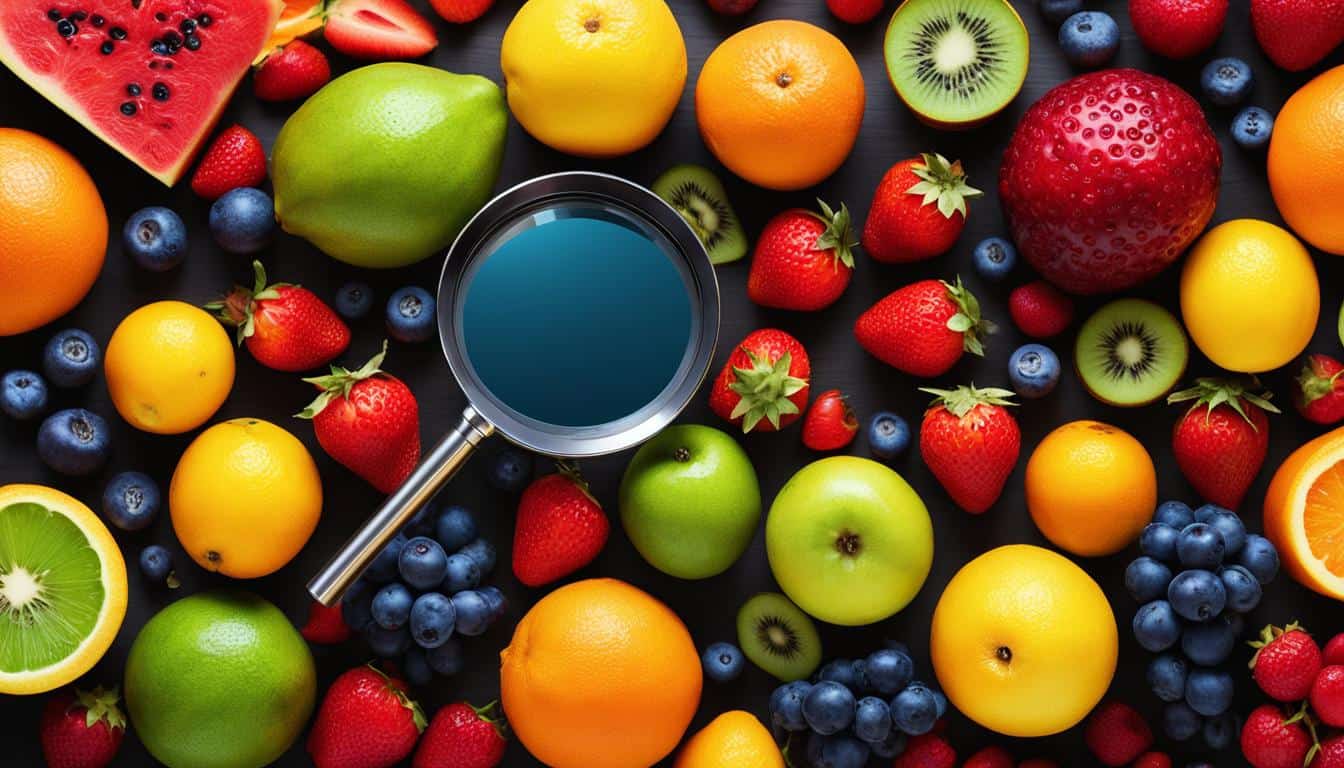In this comprehensive FAQ guide, I will answer your most pressing questions about fruit nutrition and benefits. I have gathered insights from various sources, including the Forbes Health Advisory Board, to provide you with accurate and reliable information.
Key Takeaways:
- Explore frequently asked questions about fruit nutrition and benefits.
- Get accurate and reliable information from trusted sources.
- Gain insights from the Forbes Health Advisory Board.
- Discover the health benefits of fruits and the nutritional profiles of specific fruits.
- Learn about the effectiveness of fruit supplements and how to encourage children to eat more fruits and vegetables.
Can I give my teenage boys veggie pills for extra nutrients?
As a parent, it can be concerning when your teenage boys are not keen on eating a wide variety of vegetables. You want to ensure they are getting all the necessary nutrients for their growing bodies. While fruit and vegetable pills may seem like a convenient solution, it’s important to consider their effectiveness and potential drawbacks.
Research has shown that picky eating habits in children can be influenced by various factors, including evolutionary tendencies, personality styles, and parental feeding practices. Forcing your boys to eat foods they dislike can actually lead to further resistance and create negative associations with vegetables.
Fruit and vegetable pills, also known as veggie pills, are marketed as a convenient way to bridge the nutritional gap. These pills typically contain concentrated forms of fruits and vegetables, offering additional nutrients in a convenient pill form. However, the research on their effectiveness is mixed.
It is always important to prioritize whole foods in your children’s diet and find creative ways to incorporate vegetables into their meals.
“While veggie pills may offer some extra nutrients, they cannot completely replace the benefits of consuming whole fruits and vegetables. Whole foods provide a complex mix of nutrients, enzymes, water, and fiber that work synergistically to support overall health.”
Instead of solely relying on veggie pills, consider exploring different strategies to encourage your boys to consume more vegetables. Here are a few tips:
- Be a role model: Show your boys that you enjoy eating vegetables and make them a regular part of your meals.
- Involve them in meal planning: Allow your boys to have a say in the vegetables they would like to incorporate into meals.
- Try new cooking methods: Experiment with different cooking techniques to make vegetables more appealing. Roasting, grilling, or sautéing can enhance flavors and textures.
- Sneak vegetables into dishes: Incorporate vegetables into meals in creative ways, such as adding grated zucchini or pureed spinach to pasta sauces or blending vegetables into smoothies.
- Make it fun: Cut vegetables into interesting shapes or arrange them in colorful patterns to make them more appealing.
- Offer variety: Introduce a wide range of vegetables and encourage your boys to try new ones. They might discover flavors they enjoy.
By implementing these strategies, you can gradually increase your boys’ exposure to vegetables and help them develop a taste for these nutritious foods.
The Value of Whole Foods
While veggie pills may seem like a convenient alternative, it’s important to remember that whole foods provide a wide array of nutrients and benefits that cannot be replicated by supplements.
Veggies pills may offer some extra nutrients, but they cannot replace the full nutritional package found in whole fruits and vegetables.
Whole fruits and vegetables contain essential dietary fibers that support healthy digestion and help regulate blood sugar levels. These fibers also contribute to a feeling of fullness and satisfaction after meals. Additionally, many fruits and vegetables are rich sources of antioxidants, vitamins, and minerals that provide numerous health benefits.
While veggie pills can be a temporary solution, it is important to encourage your boys to develop a lifelong habit of consuming whole fruits and vegetables to optimize their health.
The table below highlights the nutritional content of some common vegetables:
| Vegetable | Calories (per 100g) | Vitamin C (mg) | Vitamin A (IU) | Fiber (g) |
|---|---|---|---|---|
| Spinach | 23 | 28.1 | 469 | 2.2 |
| Carrots | 41 | 5.9 | 16806 | 2.8 |
| Broccoli | 55 | 89.2 | 623 | 2.6 |
| Bell Peppers | 31 | 127.7 | 1570 | 1.7 |
Remember, the nutritional content may vary slightly depending on the growing conditions and freshness of the vegetables.
Encouraging your boys to consume whole fruits and vegetables not only provides them with essential nutrients but also helps them develop a lifelong habit of making healthy food choices.
What are the health benefits of fruits?
Studies have shown that eating fruits can provide numerous health benefits. Fruits are not only delicious but also packed with essential nutrients that contribute to overall well-being.
Fruits are rich in vitamins, minerals, antioxidants, and fiber. These components play a crucial role in promoting good health and preventing diseases.
| Fruit | Health Benefits |
|---|---|
| Apples | High in fiber, vitamin C, and antioxidants |
| Oranges | Rich in vitamin C, folate, and antioxidants |
| Bananas | Good source of potassium, vitamin B6, and fiber |
| Blueberries | Packed with antioxidants, vitamin C, and fiber |
| Strawberries | High in vitamin C, manganese, and antioxidants |
By incorporating a variety of fruits into your diet, you can reap numerous health benefits. Here are some key advantages:
- Protection against diseases: Fruits contain antioxidants that help fight inflammation and oxidative stress, reducing the risk of chronic diseases such as cancer, heart disease, and stroke.
- Weight control: Fruits are low in calories and high in fiber, promoting satiety and helping to maintain a healthy weight.
- Vitamin and mineral intake: Fruits are a great source of essential vitamins and minerals, which play vital roles in various bodily functions and support overall health.
- Improved digestion: The fiber content in fruits aids in regular bowel movements and prevents constipation.
- Increased hydration: Many fruits have high water content, contributing to overall hydration and supporting proper bodily functions.
“The natural sugars found in fruits are accompanied by fiber, which helps slow down the release of sugar into the bloodstream, preventing rapid spikes in blood sugar levels.”
– Forbes Health Advisory Board
Furthermore, research by Harvard scientists has found that every daily serving of fruit is associated with an average half-pound weight loss over a four-year period. This highlights the potential of fruits in supporting weight management goals.
With their natural goodness, fruits are a delightful and healthy choice to include in your diet. So go ahead and indulge in nature’s sweet treats!
What are the nutritional profiles of specific fruits?
Fruits are not only delicious but also packed with essential nutrients that contribute to overall health and well-being. Each fruit has its own unique nutritional profile, offering a range of vitamins, minerals, and health benefits. Let’s take a closer look at the nutritional profiles of some specific fruits:
Apples
Apples are high in carbohydrates and a great source of immune-boosting vitamin C. They also contain dietary fiber, which aids in digestion and helps maintain healthy cholesterol levels.
Apricots
Apricots are rich in vitamins A and C, which are crucial for healthy skin and immune function. They are also a good source of dietary fiber and provide some essential minerals like potassium and magnesium.
Avocados
Avocados are unique among fruits as they are low in carbohydrates and high in healthy fats. These healthy fats are packed with omega-3 fatty acids, which promote heart health and have anti-inflammatory properties. Avocados are also a good source of fiber and provide essential vitamins such as vitamin K, vitamin E, and several B vitamins.
Bananas
Bananas are known for their high potassium content, which helps regulate blood pressure and keep the heart healthy. They are also an excellent source of vitamin B6, which is important for brain development and function.
Blueberries
Blueberries are not only delicious but also packed with antioxidants, such as anthocyanins, which have been linked to numerous health benefits. These antioxidants help protect against cell damage and reduce the risk of chronic diseases. Blueberries are also a good source of vitamin C and dietary fiber.
| Fruit | Nutritional Profile |
|---|---|
| Apple | High in carbohydrates and vitamin C |
| Apricot | Rich in vitamins A and C, and a good source of dietary fiber |
| Avocado | Low in carbohydrates, high in healthy fats, and a good source of fiber |
| Banana | Good source of potassium, vitamin B6, and dietary fiber |
| Blueberry | Packed with antioxidants, vitamin C, and dietary fiber |
As you can see, each fruit offers its own set of vitamins, minerals, and health benefits. Incorporating a variety of fruits into your diet can provide a wide range of nutrients that support your body’s needs. Whether you enjoy them fresh, dried, or blended into smoothies, fruits are a delicious and nutritious addition to a healthy lifestyle.

What should I know about fruit juices?
Fruit juices can be refreshing and provide essential vitamins and minerals. However, it’s important to be mindful of their sugar content and potential lack of fiber compared to whole fruits.
The sugars in fruit juices can have a more concentrated impact on your blood sugar levels and calorie intake. Opting for whole fruits instead allows you to enjoy the benefits of the fruit’s natural fiber, which aids in digestion and provides a feeling of fullness.
To illustrate, let’s compare the sugar and calorie content of a cup of apple slices versus a cup of apple juice:
| Fruit | Calories per Cup | Sugar Content per Cup |
|---|---|---|
| Apple Slices | 50 | 11 grams |
| Apple Juice | Approximately 100 | Approximately 22 grams |
As you can see, a cup of apple juice contains roughly twice the calories and sugar content of a cup of apple slices. By choosing whole fruits, you can enjoy their natural sweetness while also benefiting from fiber and other nutrients.

Remember, moderation is key when it comes to consuming fruit juices. If you enjoy a glass occasionally, try to balance it with a diet that primarily consists of whole fruits and a variety of other nutritious foods.
What are some popular fruits and their nutritional values?
There are hundreds of types of fruits worldwide, each offering its own unique flavors and nutritional benefits. Incorporating a variety of fruits into your diet can enhance your overall health and wellbeing. Let’s explore some popular fruits and their nutritional values:
1. Apples: Apples are a widely loved and consumed fruit. They are high in carbohydrates and provide a good amount of vitamin C. Apples also contain dietary fiber, which supports healthy digestion.
2. Cherries: Cherries are not only delicious but also packed with essential nutrients. They are a rich source of vitamins A and C, which are important for immune function and skin health.
3. Blackberries: Blackberries are known for their deep purple color and sweet-tart flavor. They are rich in fiber, providing digestive support, and are high in vitamin C, which boosts immunity. Blackberries also contain manganese, a mineral that plays a role in bone health.
| Fruit | Nutritional Values |
|---|---|
| Apples | High in carbohydrates, vitamin C, and dietary fiber. |
| Cherries | Rich in vitamins A and C. |
| Blackberries | Excellent source of fiber, vitamin C, and manganese. |
These examples are just a glimpse into the diverse world of fruits. From sweet and juicy to tangy and tart, fruits offer an array of flavors to suit every palate. Incorporating a variety of fruits into your daily meals and snacks can provide you with the essential vitamins, minerals, and fiber your body needs for optimal health.

Are fruit supplements beneficial?
When it comes to incorporating fruits and vegetables into our diet, some individuals may find it challenging due to personal preferences or other factors. Fruit supplements, such as fruit and vegetable pills, have emerged as a convenient alternative. However, it is important to understand that these supplements cannot fully replicate the health benefits of consuming whole foods.
Whole fruits and vegetables are not only packed with essential nutrients but also contain a complex mix of enzymes, water, and fiber that contribute to overall health and satisfaction. These components work synergistically to support digestion, promote satiety, and provide a range of health benefits. While fruit supplements may offer some benefits, they should not replace a diet rich in whole fruits and vegetables whenever possible.
“Although fruit supplements can provide a convenient way to bridge the nutritional gap, they should be seen as a tool to complement a healthy and balanced diet, rather than a substitute for whole foods.”
Table: Comparison of Fruit Supplements and Whole Fruits
| Category | Fruit Supplements | Whole Fruits |
|---|---|---|
| Nutrient Diversity | May contain a concentrated amount of specific nutrients | Provide a wide range of vitamins, minerals, and antioxidants |
| Fiber Content | Often lack dietary fiber | Contain fiber that aids digestion and promotes satiety |
| Water Content | May not contribute to hydration as effectively | Contribute to the body’s hydration needs |
| Taste and Texture | Can be convenient, but lack the natural taste and texture of whole fruits | Provide a range of flavors, textures, and sensory experiences |
| Overall Health Benefits | May offer some benefits, but cannot replicate the comprehensive effects of whole foods | Provide a holistic package of nutrients, enzymes, water, and fiber that support overall health |
It is important to note that relying solely on fruit supplements may lead to a limited intake of other essential nutrients found in a diversified diet. Variety is key when it comes to obtaining a wide array of beneficial compounds from different fruits and vegetables. Therefore, it is recommended to prioritize whole foods and explore different ways to incorporate fruits and vegetables into your daily meals and snacks.

How can I encourage my children to eat more fruits and vegetables?
Encouraging children to eat more fruits and vegetables can be a daunting task, especially if they have developed picky eating habits. However, there are several strategies you can use to make these nutritious foods more appealing to your little ones.
1. Provide a variety of options
Offering a diverse selection of fruits and vegetables can help children develop a taste for different flavors and textures. Include a mix of colorful fruits and vegetables in your grocery shopping and keep them readily available at home. This way, children can explore various options and discover their preferences.
2. Incorporate fruits and vegetables into favorite dishes
Introducing new vegetables in familiar dishes can be a great way to encourage your children to eat more vegetables. For example, adding finely chopped vegetables like carrots, broccoli, or bell peppers to spaghetti sauce or casseroles can provide added nutrition without altering the taste significantly. Gradually increase the amount of veggies over time, allowing them to get used to the flavors.
3. Hide vegetables in foods they already love
If your children are resistant to eating vegetables, you can try sneaking them into their favorite foods. Pureed vegetables can be added to smoothies, soups, or sauces, providing essential nutrients without altering the taste significantly. For example, adding spinach to a fruit smoothie or grated zucchini to muffins can be a creative way to increase vegetable intake.
4. Make it fun with frozen fruit snacks
Frozen fruit snacks can be a fun and nutritious way to introduce new flavors to your children. You can freeze grapes, berries, mango chunks, or banana slices and offer them as chilled treats. Not only do frozen fruits provide a refreshing experience, but they also offer a natural sweetness that children often enjoy.
5. Lead by example
Children tend to mimic the behaviors of their parents and caregivers. By consistently incorporating fruits and vegetables into your own diet, you can set a positive example for your children. Let them see you enjoying healthy foods and emphasize the importance of balanced eating habits.
Remember, cultivating healthy eating habits takes time and patience. It is important to be understanding and avoid pressuring your children to eat more fruits and vegetables. By creating a positive and supportive environment, you can foster a lifelong love for nutritious foods.

Encouraging children to eat more fruits and vegetables is crucial for their overall health and well-being. By providing a variety of options, incorporating these foods into favorite dishes, and making it fun, you can help your children develop a taste for nutritious foods that will benefit them throughout their lives.
Conclusion
In conclusion, the exploration of fruit nutrition and benefits can provide valuable knowledge and information to address any puzzlement or questions you may have. Fruits are not only delicious but also offer a wide range of health benefits. Each fruit has its own unique nutritional profile, providing an array of essential vitamins, minerals, and antioxidants.
Although fruit supplements like fruit pills may seem like a convenient option, it’s important to remember that they cannot replace the unrivaled benefits of consuming whole fruits. Whole fruits contain a complex combination of nutrients, enzymes, water, and fiber that contribute to your overall well-being. Therefore, it’s best to prioritize the consumption of whole fruits whenever possible.
Encouraging children to eat more fruits and vegetables can be a challenge, but with a bit of creativity and patience, it is achievable. By finding fun and appealing ways to incorporate fruits into their diet, such as introducing new flavors in familiar dishes or offering frozen fruit snacks as a treat, you can help them develop an understanding and appreciation for these nutritious foods.
Incorporating fruits into your diet not only enhances your overall health and well-being but also supports a balanced and nutritious lifestyle for you and your family. So, embrace the exploration of fruits, expand your fruit knowledge, and enjoy the numerous benefits that these wonderful gifts of nature provide.
FAQ
Can I give my teenage boys veggie pills for extra nutrients?
While fruit and vegetable pills can be an option to bridge the nutritional gap, the research on their effectiveness is mixed. It is always recommended to prioritize whole foods and find ways to incorporate vegetables into your sons’ diet.
What are the health benefits of fruits?
Studies have shown that eating fruits can protect against various conditions such as cancer, heart disease, stroke, and aid in weight control. Fruits are rich in vitamins, minerals, and antioxidants that contribute to overall health. For example, a study by Harvard researchers found that every daily serving of fruit was linked to an average half-pound weight loss over a four-year period. The antioxidant flavonoids found in fruits may also have a positive effect on metabolism.
What are the nutritional profiles of specific fruits?
Fruits have unique nutritional profiles, and their composition can vary. For example, apples are high in carbohydrates and vitamin C. Apricots are rich in vitamin A and C. Avocados are low in carbohydrates and high in healthy fats. Bananas are a good source of potassium and vitamin B6. Blueberries are packed with antioxidants and vitamin C. Each fruit offers its own set of vitamins, minerals, and health benefits.
What should I know about fruit juices?
Fruit juices contain vitamins and minerals but are often lacking in fiber compared to whole fruits. The sugars in juice can quickly enter the bloodstream, leading to a more concentrated source of sugars and calories. It is recommended to opt for whole fruits instead of juices to reap the full benefits of fiber and nutrients. For example, a cup of apple slices contains about 50 calories and 11 grams of sugars, while a cup of apple juice contains roughly twice those amounts.
What are some popular fruits and their nutritional values?
There are hundreds of types of fruits worldwide. Popular fruits such as apples are high in carbohydrates and vitamin C, while cherries provide a good amount of vitamins A and C. Blackberries are rich in fiber, vitamin C, and manganese. These fruits offer a range of flavors and nutrient profiles, making them a versatile and healthy addition to your diet.
Are fruit supplements beneficial?
Fruit supplements, such as fruit and vegetable pills, can be beneficial for individuals who have a hard time incorporating fruits and vegetables into their diet due to preference or other factors. However, it is important to note that supplements cannot replicate the full nutritional effects of whole foods. Whole fruits and vegetables contain a complex mix of nutrients, enzymes, water, and fiber that contribute to overall health and satisfaction. It is always recommended to prioritize whole foods whenever possible.
How can I encourage my children to eat more fruits and vegetables?
Encouraging children to eat more fruits and vegetables can be challenging. It is important to provide a variety of options and find creative ways to incorporate them into their favorite dishes. For example, introducing new vegetables in familiar dishes or hiding them in foods they already love can help them develop a taste for these foods. Frozen fruit snacks can also be a fun and nutritious way to introduce new flavors. It is important to be patient and understanding as children develop their food preferences.





Leave a Reply